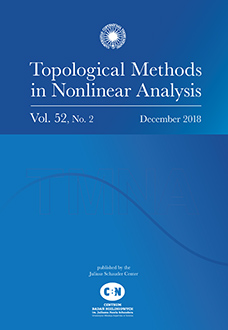Abstract
We are concerned with the existence, multiplicity and uniqueness of positive solutions for the $2n$-order boundary value problem $$ \begin{cases} (-1)^nu^{(2n)}=f(t,u,u',-u''',\ldots, \\\hskip 1.8cm (-1)^{i-1}u^{(2i-1)},\ldots, (-1)^{n-1}u^{(2n-1)}), \\ u^{(2i)}(0)=u^{(2i+1)}(1)=0, \quad i=0,\ldots,n-1, \end{cases} $$ where $n\geq 2$ and $f\in C([0,1]\times \mathbb{R}_+^{n+1},\mathbb{R}_+)$ $(\mathbb{R}_+:=[0,\infty))$ depends on $u$ and all derivatives of odd orders. Our main hypotheses on $f$ are formulated in terms of the linear function $g(x):=x_1+2\sum_{i=2}^{n+1}x_i$. We use fixed point index theory to establish our main results, based on a priori estimates achieved by utilizing some integral identities and an integral inequality. Finally, we apply our main results to establish the existence, multiplicity and uniqueness of positive symmetric solutions for a Lidostone problem involving an open question posed by P.W. Eloe in 2000.
Citation
Zhilin Yang. Donal O'Regan. "Positive solutions for a $2n$th-order boundary value problem involving all derivatives of odd orders." Topol. Methods Nonlinear Anal. 37 (1) 87 - 101, 2011.
Information





